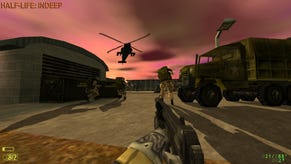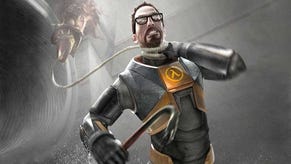Source 2: it's time for Valve to drop the baby steps
Valve was rumoured today to be working Source 2. It's time for a serious tech leap over the company's normal increments, says Dave Cook, with one reason being the release of Half-Life 3.
Valve is a developer noted for technical mastery, a powerhouse of innovation and artistry rarely outdone. It's absolutely the right time - with both Epic and Square going public with new tech and the next console generation settling in for a 2013 release - to apply that expertise to a full Source rework.
Counter-Strike, the first Valve game to run on the studio's Source engine, launched in 2004. Since then, the Seattle-based developer has incrementally updated its proprietary code with all sorts of bells and whistles, but never with a full, new, numbered version.
But when eagle-eyed gamers found files embedded in Valve Filmmaker labelled with references to "Source 2" over the weekend, the inference was obvious: could Valve be readying itself for a major leap forward in its technology, much like Epic's advances with Unreal Engine?
You can but hope. Valve's 'baby step' approach to augmenting Source may work for each new software release – bulking it it out with the specific tools to make each game run to the best of its ability – but just imagine what could be achieved with a catch-all revision.
There was a technical chasm difference between the original Half-Life - which ran on a modified Quake engine – and successor Half-Life 2. If Valve can make as significant a leap with Half-Life 3 - or whatever the next Half-Life product's going to be - then the mind races at the possibilities.
We may have already seen a glimpse of the real-time innovation that could be in store for us whenever Valve decides to reveal its follow-up.
Just check out this leaked video from an ex-Valve employee that showed off what he claimed were real-time swarm physics from Half-Life 3.
The tech demo embodies some of the key phrases currently bandied around in relation to Epic's Unreal Engine 4 and Square-Enix's Luminous Engine, specifically the notion of real-time mechanics that would typically be scripted.
Valve is a developer noted for technical mastery, a powerhouse of innovation and artistry rarely outdone. It's absolutely the right time - with both Epic and Square going public with new tech and the next console generation settling in for a 2013 release - to apply that expertise to a full Source rework.
Inevitably, talk of Source 2 has bumped up speculation of an incoming Half-Life reveal. It's easy to reach the conclusion that Valve has spent so long developing Half-Life 3 because it's Source 2's maiden voyage.
The signs are all around us, in Half-Life 3 art leaks, Valve's E3 absence and a gruelling wait now fast approaching seven years. If Source 2 and Half-Life 3 are to release hand-in-hand, the giant gap may be justified.
Rather than slam Valve's lack of Half-Life 3 communication, gamers should relish the fact that it could launch on the next-generation of the studio's tech. It's been a long wait, sure, but do you want something cobbled together on the Portal 2 version of Source, or do you want a game as innovative and mind-bending as Half-Life 2?
New engines take time, money, effort, research and a reason to exist. Epic Games didn't make Unreal Engine 4 overnight, an it certainly didn't do it without a purpose. Valve's purpose could be Half-Life 3, and we may not be far from finally getting the truth on Gordon's next adventure.
















-trailer---Sonic-%26-Knuckles.jpg?width=291&height=164&fit=crop&quality=80&format=jpg&auto=webp)


